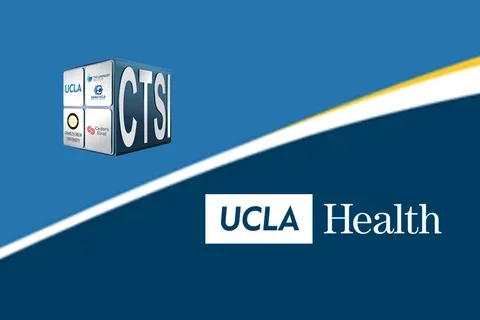UCLA Health and the UCLA CTSI’s response to the Palisades and Eaton wildfires

To Faculty, Clinicians, Researchers, and Staff of the David Geffen School of Medicine:
The recent Palisades and Eaton wildfires have had a profound impact on our Southern California community, including many within the UCLA Health family. UCLA Health, encompassing the David Geffen School of Medicine (DGSOM) and UCLA Health hospital system, alongside the UCLA Clinical and Translational Science Institute (CTSI), are central to our response. We will support our community throughout this crisis, addressing health needs with compassion, research, and innovation. As we navigate the challenges posed by these wildfires, we are committed to a response that is principled, collaborative, and forward-thinking.
Key Principles Guiding Our Approach:
- Service to the Community: UCLA Health, including DGSOM and CTSI are dedicated to supporting the broader community during disasters, ensuring that our expertise, clinical services, and research efforts contribute meaningfully to disaster response and recovery.
- Building and Maintaining Trust: Our efforts to assess and monitor the health effects of wildfires will be conducted in full partnership with affected communities. We are committed to engaging in a transparent manner that fosters trust and ensures that our interventions align with the community’s needs and concerns.
- Collaboration Across Institutions: UCLA CTSI will align its resources with the UCLA Campus, including the UCLA Center for Public Health and Disasters, UCLA Center for Healthy Climate Solutions, Sustainable LA Grand Challenge, UCLA Center for Community Engagement, UCLA Center for Natural Hazards and Resiliency, and the Emmett Institute of Environmental Law. In addition, we plan to work with other academic medical centers (AMCs) in the region, as well as other UC campuses and leading national universities. This unified approach will allow for a collaborative, efficient, and effective response to the health challenges posed by these wildfires.
- Comprehensive Health Impact Assessment: The wildfires have the potential to create both short- and long-term physical and mental health effects. We are taking a broad perspective that considers:
- Those within the fire lines and evacuation zones.
- Individuals who work and go to school in affected areas but reside elsewhere.
- The larger Los Angeles County population, which may experience air quality and environmental health impacts from shifting winds and cleanup efforts.
- Lifecourse stage, including needs and risks specific to children, adults, and seniors
UCLA Health and CTSI’s Initiatives in Response to the Wildfires:
- Creation of the UCLA Health Wildfire Steering Committee
- This committee will coordinate, align, prioritize, and track our wildfire-related efforts in collaboration with the UCLA Campus, other AMCs, state and city public health agencies, and community organizations. We have asked Dr. David Eisenman to serve as the Chair of this committee.
- Establishment of the UCLA Health Wildfire Research Fund
- This fund will support rapid pilot grant submissions to study the effects of the wildfireson health to complement the campus pilot funding through the OVCR. We encourage researchers across UCLA Health and the UCLA Campus to propose studies that address both immediate and long-term health consequences of wildfire exposure.
- Launch of a UCLA Health Wildfire Registry
- This initiative will create a registry of individuals affected by the wildfires to support ongoing and future research. The registry and biobank will enable researchers to investigate the long-term health impacts of wildfire exposure, including respiratory, cardiovascular, and mental health effects. This centralized registry approach will help protect impacted people from being repeatedly sought out by researchers for different studies, and at the same time, encouraging excellent research, serving a public health purpose, being comprehensive, and including those exposed and willing to participate.
- Formation of the UCLA Health Wildfire Prioritization Committee
- This committee will ensure a thoughtful and structured approach to studies involving UCLA Health patients, UCLA Health resources (registries, biomaterials, etc.), and UCLA Health and Campus Research Infrastructure. This framework will allow for rapid study initiation while maintaining rigorous ethical and scientific oversight, including accelerated IRB review where appropriate.
The wildfires serve as a stark reminder of the environmental challenges we face as a region and as a healthcare system. We are committed to leveraging the expertise and resources of UCLA Health, CTSI, and our community partners to both respond to the immediate crisis and develop long-term strategies for protecting and improving community health in the face of future disasters. We appreciate the dedication and expertise of our faculty, staff, patients, and community partners as we come together to address this urgent challenge. Further updates, opportunities for engagement, and funding announcements will follow in the coming weeks.
Thank you for your commitment to the well-being of our community.
Sincerely,
Paul C. Boutros, PhD, MBA
Professor, Department of Human Genetics and Urology
Vice Dean for Research (Interim), David Geffen School of Medicine
Arleen F. Brown, MD, PhD
Co-Director, Clinical and Translational Science Institute
Co-Leader, CTSI Community Engagement & Research Program
Arash Naeim, MD, PhD
Associate Dean for Clinical Research
Co-Director, Clinical and Translational Science Institute
Chief Medical Officer for Clinical Research, UCLA Health
Mitchell D. Wong, MD, PhD
Co-Director, Clinical and Translational Science Institute
Co-Director, UCLA CTSI KL2 Program
Co-Director, DGSOM Office of Physician Scientist Career Development